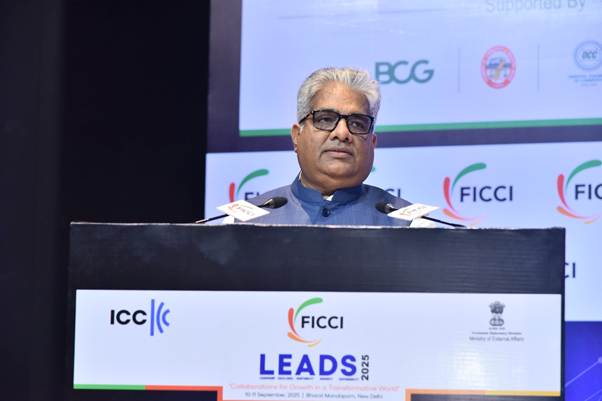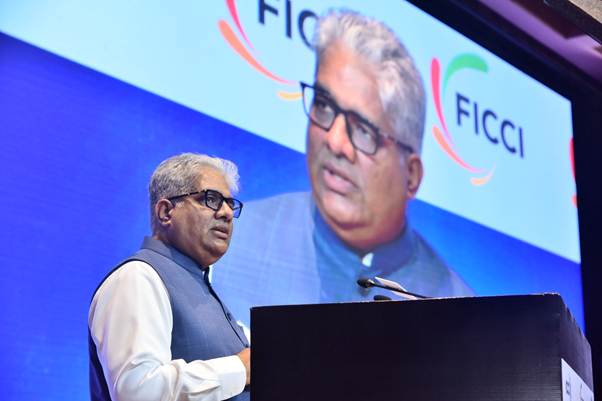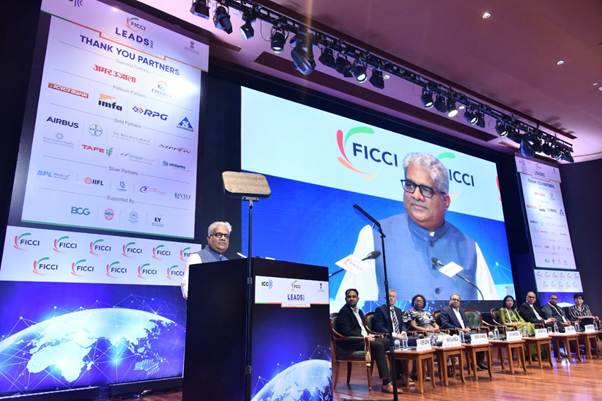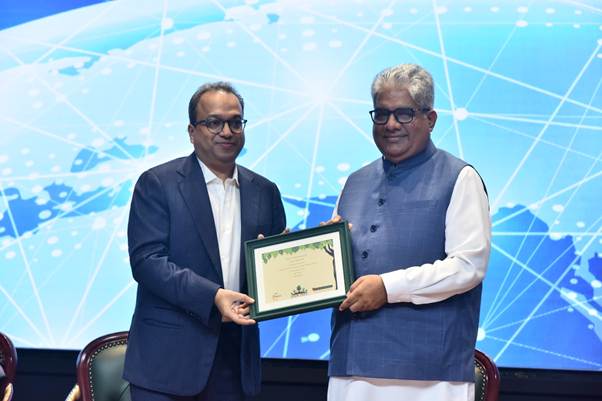Ministry of Environment, Forest and Climate Change
Union Minister Shri Bhupender Yadav highlights Green Finance as the cornerstone for sustainable and collaborative growth at FICCI’s 4th Edition of LEADS today
Green Finance is the backbone of resilient and competitive economies: Shri Bhupender Yadav
Sovereign Green Bonds attract strong global investor confidence in India’s green growth potential
Article 6 of Paris Agreement vital to unlock billions in climate finance
MoEFCC revises Green Credit Programme methodology to enable private sector participation and eco-restoration commitments
Failing to finance green transition is a moral failure towards future generations
Posted On:
11 SEP 2025 11:20AM by PIB Delhi
Union Minister for Environment, Forest and Climate Change, Shri Bhupender Yadav, today addressed the 4th Edition of FICCI’s LEADS on the theme “Collaborations for Growth in a Transformative World”. Delivering a keynote address on the subject of Green Financing, the Minister underscored that the pathway to building economies of the future rests on aligning progress and profits with sustainability, with people and ecosystems placed at the centre of growth. He stressed that collaborative growth among governments, industry, regulators, global financial institutions, and citizens is key to meeting the challenge of climate change while ensuring inclusive economic development.
In his address, the Minister took the audience through the journey of industrialisation and progress that has contributed to global environmental degradation over the past two centuries. He pointed out that the rising global temperature thresholds—1.5 to 2 degrees Celsius—symbolise not merely climate science but the consequences of unsustainable growth. The industry, he argued, must be mindful not only of its profit figures but also of the environmental costs hidden behind them.
Shri Yadav explained that the 21st century presents a twin responsibility for nations such as India: meeting the developmental aspirations of a young and ambitious population while simultaneously protecting the planet from the impact of climate change, biodiversity loss and ecological degradation. Under the leadership of Prime Minister Shri Narendra Modi, India has chosen a path that is marked by ambition, innovation, and transformation. The Minister lauded Indian industry, represented by FICCI at the event, for reflecting the spirit of pursuing both economic growth and ecological sustainability.
He emphasised that green finance is not to be seen as a niche intervention but as the backbone of competitive and resilient economies. It involves restructuring capital flows so that every investment—in infrastructure, agriculture, transport, or industry—not only yields economic returns but simultaneously strengthens sustainability. Green financing, he stressed, must form economic systems in which growth is interwoven with ecological well-being and the health of communities.
Shri Yadav highlighted steps taken by India to build confidence in green investments. The issuance of sovereign green bonds, which have attracted wide international interest, was cited as evidence of strong confidence in India’s green development potential. Regulators such as the Reserve Bank of India and the Securities and Exchange Board of India are also intensifying action to promote responsible disclosure, accountability and transparency in green instruments, thereby ensuring long-term trust and stability in the sector. Alongside, India is fostering blended finance mechanisms that leverage public money to de-risk and accelerate private investment in renewable energy, energy efficiency, electric mobility, waste-to-wealth and nature-based solutions. Given that India will require over USD 10 trillion by 2070 for achieving its net zero ambitions, such mechanisms are vital.
The Minister laid down three core principles guiding India’s climate action efforts. First, that climate finance is indistinguishable from development finance. Second, that clean power, efficient cities, climate-smart agriculture, and resilient infrastructure are not additions but the very foundation of national security and industrial competitiveness. Third, that those countries which mobilise green investments today will dominate the future value chains of industry and trade. He observed that developed countries bear a moral responsibility to support the global South, observing that the UNFCCC process target of USD 300 billion by 2035 is inadequate and does not reflect the scale of the challenge.
Recognising the role of carbon finance, Shri Yadav highlighted the critical importance of operationalising Article 6 of the Paris Agreement. He explained how high-integrity carbon markets, governed by transparency and accountability, can channel billions into climate action. Article 6 mechanisms allow countries to bilaterally and multilaterally trade climate outcomes, creating both a financial incentive and access to new technologies. Such tools, he underlined, not only expedite emission reductions for buyer countries but also enable seller countries to access finance and capacity development. Quoting UNEP Executive Director Inger Andersen, he reminded the gathering that “Finance is the make-or-break issue for climate action.”
The Minister also spoke about the Government of India’s Green Credit Programme, launched in October 2023, as an innovative instrument to encourage individuals and institutions to voluntarily undertake positive environmental action such as eco-restoration. He informed the gathering that on 29 August 2025, a revised methodology for the programme was notified by the Ministry of Environment, Forest and Climate Change, introducing new elements including direct participation by private entities, mandatory minimum restoration commitments and greater scope for utilisation of credits. These measures aim not only at mobilising private capital but also at ensuring transparency and measurable outcomes to benefit climate action on the ground.
The Union Minister referred to India’s strong positioning as the fastest-growing major economy with a large renewable energy expansion, a vibrant start-up ecosystem, and a young, skilled population prepared to lead innovation. He pointed out that green finance would play a crucial role in unlocking investments across sectors such as solar and wind power, green hydrogen, sustainable agriculture, the circular economy, and climate-resilient infrastructure. These areas hold the potential to generate millions of jobs, strengthen competitiveness, and secure India’s energy future.
Shri Yadav emphasised that financing mechanisms for this transition must ensure inclusivity, providing benefits to MSMEs, farmers and vulnerable communities. He also underscored the role of innovation in financing, stressing that financial technology, digital platforms, and AI-led approaches can make green financing more efficient, transparent and scalable. Instruments such as green bonds, sustainability-linked loans, carbon markets and impact investment funds, he said, must move from margins to mainstream.
The Minister called upon stakeholders to view the financing of the green transition as an ethical and moral responsibility to future generations. A failure to act now, he warned, would be tantamount to placing short-term comfort above the survival and well-being of future generations. He reaffirmed India’s commitment under Prime Minister Shri Narendra Modi’s leadership to pioneer sustainable growth, fulfil global climate responsibilities, and safeguard the future of the planet.




***
GS
(Release ID: 2165541)
Visitor Counter : 562